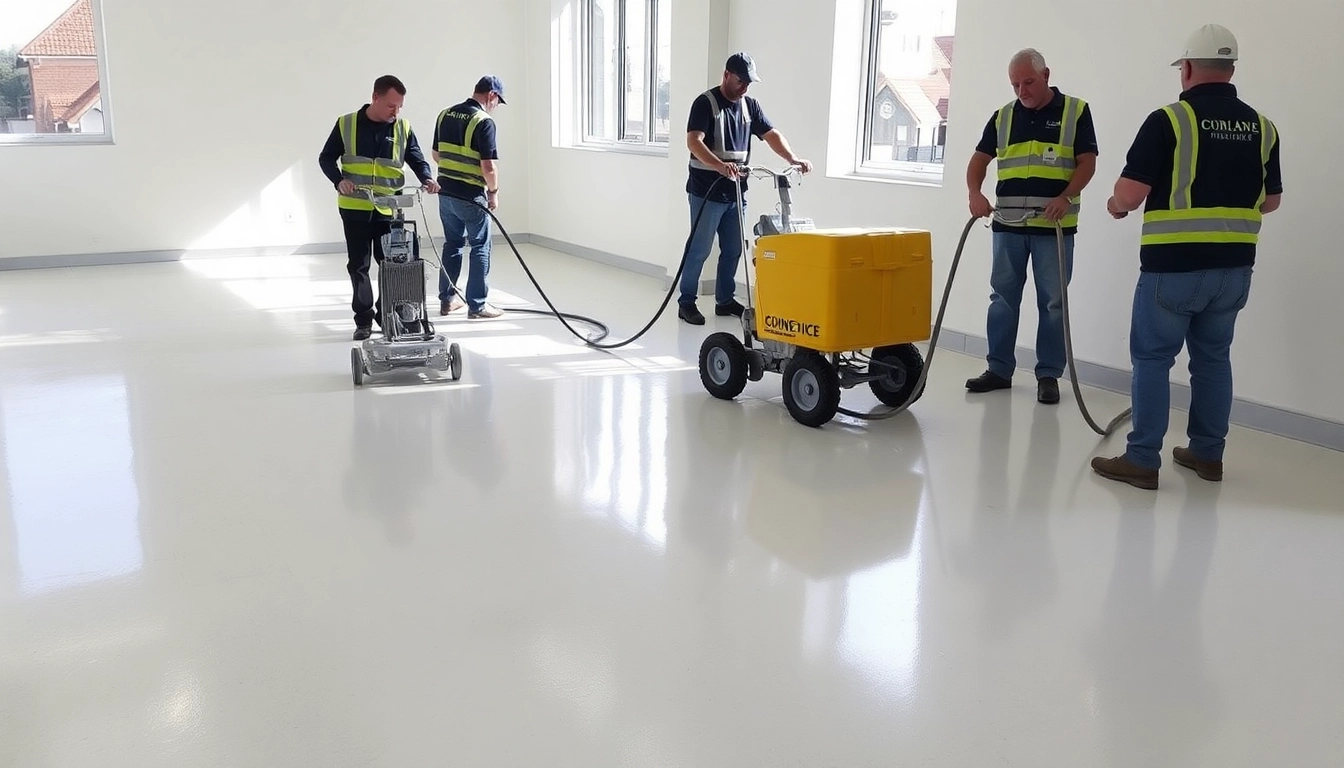Understanding Liquid Screeding and Its Benefits in Birmingham
In the fast-paced construction and renovation industries of Birmingham, the demand for efficient, durable, and high-quality flooring solutions has surged significantly. Among the innovative flooring methods gaining traction is Liquid screeding Birmingham. This modern technique offers numerous advantages over traditional methods, making it an ideal choice for both residential and commercial projects across the West Midlands. This article explores the essentials of liquid screeding, its benefits, the critical factors for choosing the right contractor, and practical guidance to ensure successful installation and longevity of your floors.
What is liquid screeding and how does it differ from traditional methods?
Liquid screeding is a highly fluid, pumpable floor screed composed of a carefully engineered mix of aggregates, cement, water, and sometimes chemical admixtures to improve flowability and performance. Unlike conventional sand and cement screeds that require manual mixing and setting time, liquid screed is poured directly onto prepared substrates, flowing seamlessly to fill intricate contours and small gaps. This material typically cures faster and provides a more level surface with minimal manual intervention.
Traditional screeding involves mixing dry sand, cement, and water, which can be labor-intensive, time-consuming, and susceptible to inconsistencies. It also often requires multiple layers, manual screeding, and extensive finishing work. Conversely, liquid screeding’s ability to be pumped directly results in uniform thickness, reduced installation time, and a smoother surface ready for flooring layers.
Advantages of using liquid screed for Birmingham residential and commercial projects
Speed and Efficiency
One of the most significant benefits of liquid screeding is its rapid application process. Projects that might take several days with traditional screeding can often be completed within a fraction of the time. The pumping process allows for quick coverage of large areas, making it especially suitable for big commercial developments in Birmingham or time-sensitive residential refurbishments.
Superior Flatness and Finish
The fluid nature of liquid screed ensures an exceptionally smooth and level surface. This precision reduces or eliminates the need for additional levelling layers, saving costs and time. For projects demanding high-quality finishes, especially when installing premium underfloor heating systems or intricate flooring designs, liquid screed provides an ideal foundation.
Enhanced Thermal Performance
Liquid screed seamlessly integrates with underfloor heating systems, allowing for efficient heat transfer due to its void-free, uniform application. When combined with proper insulation, it significantly improves the energy efficiency of buildings, reducing heating costs and providing comfortable living and working environments across Birmingham’s varied climate.
Crack Resistance and Durability
Thanks to its homogenous composition and flexible curing properties, liquid screed exhibits high resistance to cracking and structural movements. This durability is critical in Birmingham’s fluctuating weather conditions and varying structural loads, ensuring long-term performance and minimizing repairs.
Versatility
Liquid screeding adapts well to complex architectural designs, underfloor heating, and lightweight flooring options. Its ability to pour into confined spaces and corners makes it suitable for renovation projects on tight timelines or limited access sites.
Key factors influencing the choice of liquid screeding in Birmingham’s climate and building standards
Birmingham’s unique climate and local building codes influence the selection and application of liquid screed. Factors such as temperature fluctuations, humidity levels, and the presence of underfloor heating necessitate tailored formulations and application techniques.
- Climate Conditions: The Midlands’ weather can cause variations in drying and curing times. Contractors must choose screed mixes with appropriate setting properties and employ climate-controlled curing methods to prevent issues like cracking or delayed curing.
- Building Standards: Birmingham follows UK building regulations that mandate specific load-bearing capacities, insulation standards, and moisture control. Ensuring the screed complies with these standards guarantees safety, energy efficiency, and long-term performance.
- Substrate Quality: Proper preparation of subfloors, including moisture barriers and level surfaces, is essential to minimize defects and ensure optimal adhesion.
- Integration with Underfloor Heating: The compatibility of liquid screed with hydronic or electric underfloor heating systems must be verified, considering heat transfer efficiency and preventative measures against overheating or thermal expansion.
How to Choose a Reliable Liquid Screeding Contractor in Birmingham
Qualities to look for in a professional liquid screeding service
Selecting the right contractor is crucial for project success. Look for companies with proven experience in Birmingham-specific projects, reputable references, and industry accreditations. A professional team will provide comprehensive consultations, transparent pricing, and adherence to health and safety standards. Additionally, certification in recognized industry standards such as the Federation of Master Builders (FMB) or BES 6001 ensures quality assurance.
Questions to ask potential contractors about experience and process
Key questions include:
- How many years of experience do you have with liquid screeding in Birmingham?
- Can you provide references or case studies from similar projects?
- What type of liquid screed formulations do you recommend for this climate?
- What is your process for substrate preparation and curing?
- How do you ensure quality control during project execution?
Understanding costs, timelines, and warranties before hiring
A credible contractor will offer clear quotations detailing materials, labor, and additional costs. Expect project timelines to include preparation, pouring, curing, and finishing phases, with contingency plans for delays. Warranties covering the installed screed’s performance and any potential defects are vital for peace of mind, reflecting contractor confidence in their workmanship.
Step-by-Step Guide to Installing Liquid Screed in Birmingham Properties
Preparation of surfaces and choosing the right screed mix
Successful installation begins with thorough ground preparation: removing debris, leveling the subfloor, and installing moisture barriers if necessary. Accurate assessments of moisture content and substrate stability guide the selection of appropriate screed mixes—whether standard, Anhydrite-based, or fast-setting formulations suited for Birmingham’s conditions.
The installation process: pouring, leveling, and curing techniques
Experienced contractors use pumps to pour the liquid screed uniformly. After pouring, they employ laser-guided screeding tools for precise leveling. Curing involves maintaining optimal humidity and temperature, often with plastic sheets or curing compounds, to prevent premature drying or cracking. This process typically takes 24–72 hours, depending on the mix and environmental factors.
Post-installation care and troubleshooting common issues
Post-installation, floors should be protected from excessive foot traffic and rapid drying. Regular monitoring for signs of cracking or unevenness allows early intervention. Common problems like curling edges or surface laitance can be mitigated through proper curing and finishing practices. Clear communication with the contractor about maintenance ensures long-lasting results.
Maximizing Performance and Longevity of Liquid Screed Floors
Best practices for maintenance and cleaning
Liquid screed floors require minimal maintenance. Routine cleaning with damp mops and avoidance of harsh chemicals preserve their finish. For floors with underfloor heating, ensuring proper temperature regulation and periodic inspection maintains system efficiency.
Integrating underfloor heating with liquid screed systems in Birmingham
Liquid screed is highly compatible with underfloor heating, offering close contact and efficient heat transfer. Proper design, including appropriate screed thickness and insulation layers, maximizes thermal performance. Working with experienced installers ensures optimal system integration, reducing energy costs and improving comfort.
Monitoring and ensuring long-term durability of your screeded floors
Long-term durability hinges on vigilant maintenance, periodic inspections for cracking or moisture issues, and timely repairs. Employing protective coatings or sealants can further extend the lifespan of the screed floor, especially in high-traffic or commercial environments in Birmingham.
Case Studies and Success Stories in Birmingham
Commercial projects showcasing speedy installation and efficiency
Many Birmingham commercial developments, such as office buildings and retail outlets, have benefited from liquid screeding’s rapid installation. For example, a recent project in the city center completed a 1000m² warehouse floor within a week, allowing tenants early access and minimizing downtime.
Residential homes achieving superior thermal performance
Resident refurbishments and new builds have reported significant energy savings owing to liquid screed’s excellent thermal properties. Homeowners across Sutton Coldfield and Solihull have also praised the smooth finish, which reduces the need for additional leveling and post-installation work.
Customer testimonials emphasizing quality and service excellence
Clients consistently highlight the professionalism, punctuality, and technical expertise of Birmingham-based liquid screeding contractors. Their satisfaction underscores the importance of choosing experienced specialists for guaranteed results.



